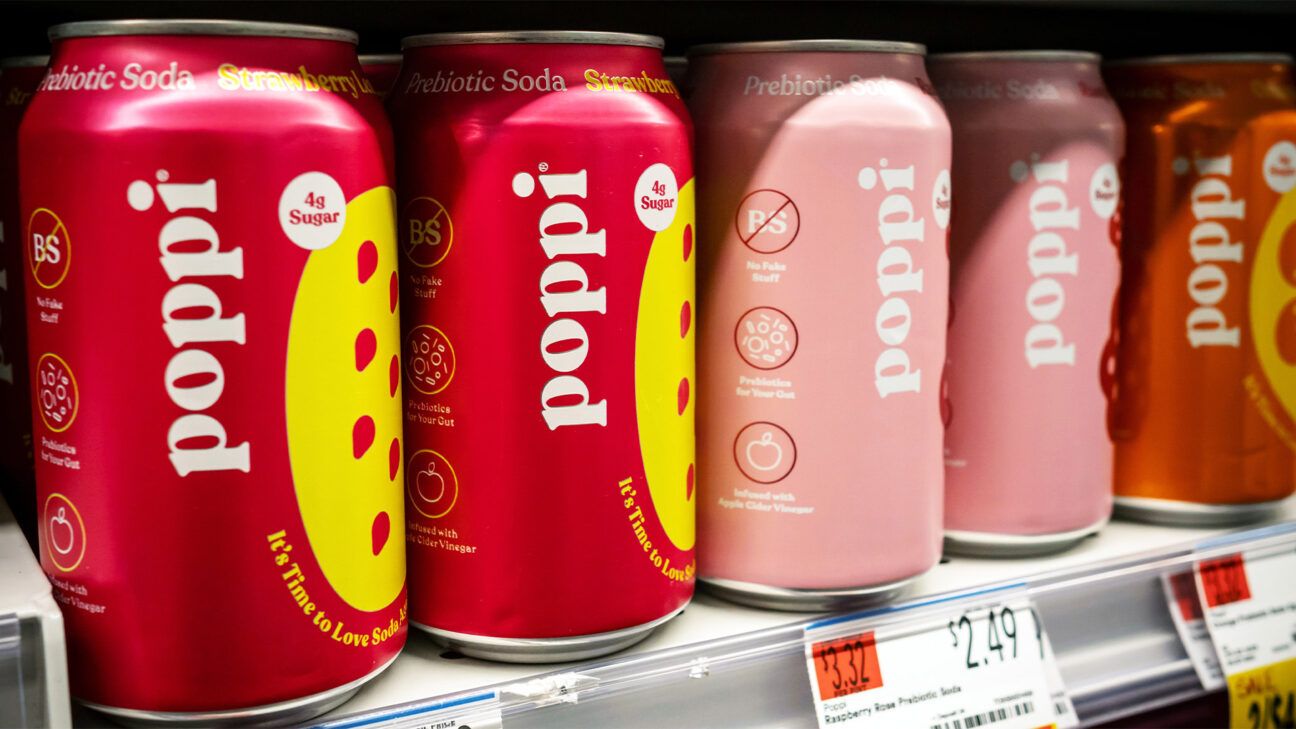
- Poppi brand soda is being sued for claims of consumer fraud and false and misleading advertising.
- A class action lawsuit alleges that the drinks’ prebiotic fiber content is insufficient to provide meaningful gut health benefits.
- Experts say the amount of prebiotic fiber included in each can is likely insufficient, but Poppi is still a healthier choice than most other sodas
- You can get more prebiotics into your diet by eating certain plant and fermented foods.
Prebiotic soda brand Poppi, beloved by celebrities, is being sued on claims of consumer fraud and “false and misleading claims.”
The class action lawsuit alleges that the brand’s claims that the drink is good for health are untrue.
They say the drink, billed as a “better for you” soda, does not provide meaningful prebiotic effects.
Poppi’s marketing has centered on the soda’s inclusion of prebiotic fibers, which are beneficial for gut health.
However, the lawsuit claims, “Poppi soda only contains two grams of prebiotic fiber, an amount too low to cause meaningful gut health benefits for the consumer from just one can.”
Rebecca Russell, a functional medicine registered dietitian specializing in gut health, says this looks like another case of brands overpromising on the health benefits of their products.
“All too often I see products that claim to be a ‘magical’ fix for a specific problem, when in reality our bodies are complex, and no one thing will be the fix,” she points out.
Russell believes the prebiotic fiber in Poppi sodas is far too low to meaningfully improve gut health.
“It is thought that closer to 3-10 grams of prebiotic fibers a day is considered effective in altering the gut microbiome,” she says, pointing to a
Another thing to note is that a variety of prebiotic fibers is key to gut health.
“Products like Poppi are just one type of prebiotic fiber, so it lacks that diversity that our guts need,” Russell explains.
Like Russell, board certified registered dietitian Tiffany Ma says two grams of prebiotic fiber per can is likely insufficient to create meaningful changes in gut microbiota or overall gut health when consumed as a stand-alone source.
“Prebiotics are non-digestible food components that selectively stimulate the growth and activity of beneficial gut bacteria,” she explains. “They can improve gut health by enhancing digestion, boosting the immune system, and increasing the production of short-chain fatty acids (SCFAs) like butyrate, which have anti-inflammatory properties and support the integrity of the gut lining.”
Does she believe a drink like Poppi could have a negative impact on the gut?
Ma says the gut is unique and complex and differs so much from individual to individual that it’s difficult to tell.
However, she does point out that the inclusion of “added prebiotics” (insulin) in Poppi can actually cause
“Since Poppi is a liquid very little digestion is taking place, and that can heighten these negative effects,” she explains.
Russell shares similar concerns. She says Poppi is unlikely to have a positive effect on your gut microbiome, largely because no single food or drink item can serve as a comprehensive solution for gut health.
“This beverage may actually lead to unwanted gut symptoms such as gas, bloating, and loose stools as too much inulin, which is the prebiotic fiber included here, can potentially cause symptoms,” she explains.
Another area of concern is sugar content. At 4 grams of sugar per 12 fluid oz can, Poppi is significantly lower in sugar than most sodas.
Still, Russell says it would be better to get prebiotic fiber from other food sources that do not have added sugars.
She says that excess sugar can harm gut bacteria, disrupting their delicate balance.
“One ingredient that can be called into question is ‘natural flavors’ since this term is broad and encompasses a wide range of substances that may not be health-promoting,” Russell notes. “Despite being derived from natural sources, these flavorings undergo significant processing and may end up being chemically similar to artificial flavorings.”
In spite of that, unless you’re drinking a lot of Poppi every day, it’s unlikely to have any serious negative health effects.
“Unless one consumes a 12-pack of Poppi per day, there truly wouldn’t be any major health concerns to make note of,” says Ma.
She believes Poppi can still prove to be a healthier alternative to full-calorie sodas for heavy soda drinkers or those who are looking to manage their weight.
If you are looking for a healthier alternative to Poppi, there are plenty to choose from. Eating more whole foods is the best way to get more prebiotic fiber in your diet.
“For meaningful prebiotic effects, consider foods naturally high in prebiotics, such as garlic, onions, leeks, asparagus, bananas, and whole grains like oats and barley,” advises Ma.
She says eating a diverse range of plant foods is key.
“Aiming for at least
Fermented foods are beneficial, too.
“Foods like yogurt, sauerkraut, kimchi, kefir, and miso contain probiotics that can help balance the gut microbiome,” Ma notes.
Russell agrees. She says “eating the rainbow” by filling your plate up with colorful whole foods is a great way to get a variety of prebiotics into your diet.
Limiting your sugar intake is also a good idea to optimize your gut health.
“Excess added sugars can promote the growth of harmful bacteria in the gut and lead to a decrease in beneficial bacteria, so aim for less than 10% of total calories to come from added sugars,” Ma advises.
Poppi sodas likely don’t have enough prebiotic fiber to provide any meaningful benefit to your gut health.
However, that doesn’t mean they can’t be enjoyed in moderation.
They appear to be a healthier alternative to most other sodas, which typically have a much higher sugar content.
